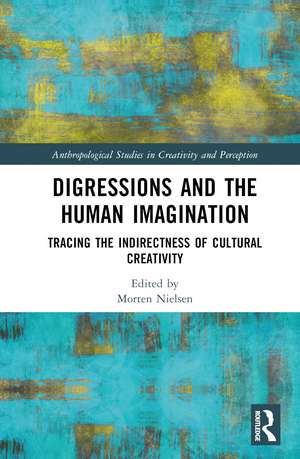Digressions and the Human Imagination: Tracing the Indirectness of Cultural Creativity: Anthropological Studies of Creativity and Perception
Editat de Morten Nielsenen Limba Engleză Hardback – 30 sep 2024
Preț: 1002.50 lei
Preț vechi: 1222.56 lei
-18% Nou
Puncte Express: 1504
Preț estimativ în valută:
191.85€ • 199.56$ • 158.39£
191.85€ • 199.56$ • 158.39£
Carte tipărită la comandă
Livrare economică 14-28 aprilie
Preluare comenzi: 021 569.72.76
Specificații
ISBN-13: 9781032519920
ISBN-10: 1032519924
Pagini: 240
Ilustrații: 44
Dimensiuni: 156 x 234 mm
Greutate: 0.52 kg
Ediția:1
Editura: Taylor & Francis
Colecția Routledge
Seria Anthropological Studies of Creativity and Perception
Locul publicării:Oxford, United Kingdom
ISBN-10: 1032519924
Pagini: 240
Ilustrații: 44
Dimensiuni: 156 x 234 mm
Greutate: 0.52 kg
Ediția:1
Editura: Taylor & Francis
Colecția Routledge
Seria Anthropological Studies of Creativity and Perception
Locul publicării:Oxford, United Kingdom
Public țintă
PostgraduateCuprins
Introduction; Part 1. METHODOLOGY; 1. “Mind-Wandering and Mushrooming in Russian Art and Literature”; 2. “Learning how to Digress in Clown Training Workshops”; 3. “…and Six Digressive Leaps: Methodology”; Part 2. TIME; 4. “… a digressive conversation about digression in creative writing”; 5. “Digression Doubled: Stand-Up Comedy as Transformative Trickery”; 6. “…and Six Digressive Leaps: Time”; Part 3. CONNECTIONS; 7. “Mythic Digressions in Science”; 8. “Comedic Comparisons: Absurd Juxtapositions and the Value of Digressive Truths”; 9. “…and Six Digressive Leaps: Connections” Part 4. INTERIORITY; 10. “Myrkur as Mother North: Feminist Digressions in Black Metal Culture”; 11. “Beating Around the Bush: Digression while Wayfinding the Kalahari Desert”; 12. “…and Six Digressive Leaps: Interiority” Part 5. AESTHETICS 13. “Life-Affirming: The Digressive Practice of Art Appreciation”; 14. “Fischart … Sancho … Beckett … Joyce; or, An Essay in Praise of Babble”; 15. “…and Six Digressive Leaps: Aesthetics”; 6. TRACES; 16. “Naboland. Unplanned Journeys of Discovery”; 17. “Universal Basic Income and the Colonization of Mars: tracing the effects of policy ideas that are yet to be implemented”; 18. “…and Six Digressive Leaps: Traces”
Notă biografică
Morten Nielsen is a social anthropologist working on socially sustainable urban development. And stand-up comedy. Since November 2018, he has been based at the National Museum of Denmark as Research Professor and Head of the Research Center for Social Urban Modelling (SUMO). Based on ethnographic fieldwork in Southern Africa (Mozambique), Latin America (Brazil), the US (New York City), the UK (Scotland), and Denmark, he has published on such issues as urban development, state formation, vernacular architecture, time and temporality, human creativity, and stand-up comedy.
Descriere
Digressions and the Human Imagination makes a significant contribution to our anthropological knowledge about human creativity. The creative force of the human imagination is widely considered as a key ingredient in understanding how social and cultural transformations occur.











